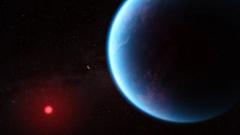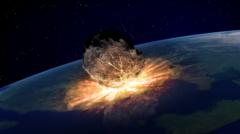In a groundbreaking discovery, scientists from Cambridge University have detected potential signs of life on an exoplanet known as K2-18b, located an astounding 700 trillion miles from Earth. This research, utilizing NASA's James Webb Space Telescope (JWST), has unveiled intriguing chemical signatures in the planet's atmosphere that could indicate the presence of simple organisms.
K2-18b, which is approximately two and a half times the size of Earth, was previously studied, but this latest detection marks a significant advance in the quest to identify life beyond our planet. The research team has pinpointed the presence of at least one of two molecules—dimethyl sulphide (DMS) or dimethyl disulphide (DMDS)—both of which are known to be produced by marine phytoplankton and certain bacteria on Earth.
Lead researcher Professor Nikku Madhusudhan expressed optimism about the findings, highlighting the unexpected large quantities of the gases detected during observations. "If this association with life is valid, it would imply that K2-18b is teeming with life," he stated, envisioning a future where the presence of life on this planet might affirm the commonality of biological existence throughout the galaxy. However, the professor cautioned that further data is needed to solidify these claims, emphasizing that current results only achieve a confidence level of approximately 99.7%—while a five-sigma result (99.99999%) is requisite for definitive proof.
Critics of the study stress that, even with heightened confidence in the detection, distinguishing biological origins from non-biological phenomena remains unresolved. Professor Catherine Heymans, Scotland's Astronomer Royal, indicated that further investigation into the atmospheric origins of detected gases is imperative. Simultaneously, researchers are exploring alternative non-living explanations for the signals observed on K2-18b, recognizing that scientific discourse around the planet's nature is an ongoing and active area of investigation.
In light of the newly acquired data, debates on K2-18b's geological characteristics have surfaced, with some scientists positing it could have a vast ocean, while others suggest a molten rock ocean further complicates the prospect for life. As researchers engage in rigorous discussions to clarify the planet's true composition and the significance of its atmospheric markers, Professor Madhusudhan remains determined to push for definitive conclusions in the near future.
The intriguing findings have been documented in The Astrophysical Journal Letters, with widespread anticipation surrounding the future exploration of K2-18b that could radically alter our understanding of life's existence on a cosmic scale. As the search for extraterrestrial life continues, this pivotal research instance may represent a significant turning point in humanity's quest to answer whether we are alone in the universe.









